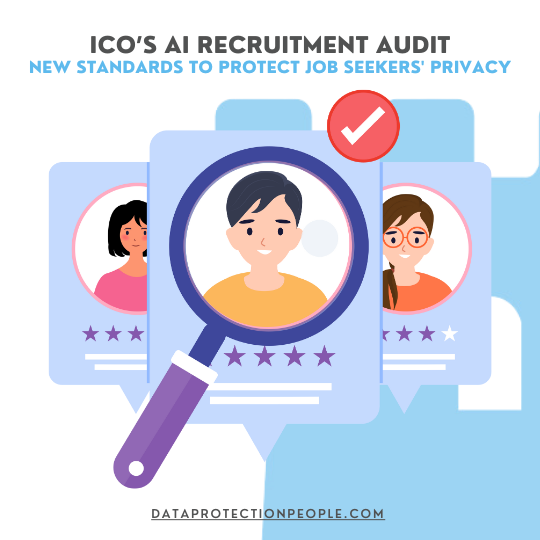ICO’s AI Recruitment Audit
Critical Recommendations to Improve Data Protection in AI-Powered Recruitment
For AI developers, the ICO’s report acts as a clear guide to building responsible, trustworthy recruitment tools that protect individual privacy rights and ensure fairness in hiring processes. Recruiters looking to integrate AI technology can use the ICO’s newly released checklist to assess potential AI tools and ensure they are choosing platforms that meet legal and ethical standards.

ICO Issues Critical Recommendations to Improve Data Protection in AI-Powered Recruitment
The Information Commissioner’s Office (ICO) recently released a comprehensive report on AI recruitment tools, sharing over 300 recommendations to protect job seekers’ information rights. With AI systems increasingly used to streamline recruitment tasks such as screening resumes and scoring candidates, these tools present both valuable efficiencies and potential risks. If AI algorithms are not carefully developed with fairness, transparency, and compliance in mind, they can negatively impact candidates, excluding them unfairly or compromising their privacy.
Key Findings and Recommendations from the ICO Audit
Following a series of audits involving AI developers and providers, the ICO identified several areas for improvement in how personal data is handled within recruitment processes. The audited organisations largely embraced the ICO’s recommendations, signalling an important step forward in responsible AI development.
Some of the most critical recommendations include:
- Fair Data Processing and Minimisation: AI tools should handle job seekers’ data in a way that is both fair and necessary, avoiding over-collection and storage of sensitive information. This reduces the potential for bias and helps ensure that only essential data is retained.
- Clear Communication with Candidates: Job seekers deserve transparency about how their data will be used within an AI-powered system. The ICO advised companies to clearly explain these processes to candidates, a move that can build trust and confidence in the technology.
- Accurate and Bias-Free Data Collection: Some AI systems were found to infer characteristics like gender and ethnicity based on a candidate’s name, rather than asking for this information directly. The ICO recommended that AI tools collect accurate, self-reported data and implement regular checks to prevent discrimination.
- Transparent Retention Policies: Companies should inform candidates about how long their data will be retained and ensure that personal information is not indefinitely stored in extensive databases without their knowledge.
These recommendations form part of the ICO’s commitment to ensuring that AI technology is applied in a manner that respects individuals’ rights. As noted by Ian Hulme, the ICO’s Director of Assurance,
“AI can bring real benefits to the hiring process, but it also introduces new risks that may cause harm to job seekers if it is not used lawfully and fairly.”
What This Means for AI Developers, Recruiters, and Job Seekers
For AI developers, the ICO’s report acts as a clear guide to building responsible, trustworthy recruitment tools that protect individual privacy rights and ensure fairness in hiring processes. Recruiters looking to integrate AI technology can use the ICO’s newly released checklist to assess potential AI tools and ensure they are choosing platforms that meet legal and ethical standards.
Job seekers, meanwhile, benefit from the ICO’s intervention, which mandates greater transparency and accountability in AI-driven hiring. With these changes, candidates can expect clearer information on how their data is processed and a more equitable recruitment experience.
Join the Conversation on Data Protection Made Easy
At Data Protection People, we’re committed to keeping you informed about the latest developments in data protection and privacy. Join us for our upcoming Data Protection Made Easy podcast on 15 November, where our hosts will delve into the ICO’s findings, discuss the report’s implications, and explore other key news topics. You can register for the session via our Events section, and we welcome anyone interested in staying up-to-date with industry news.
For more insights on data protection and to read about recent regulatory changes, visit our Resource Centre, where we regularly post articles to help businesses navigate evolving data protection standards.
